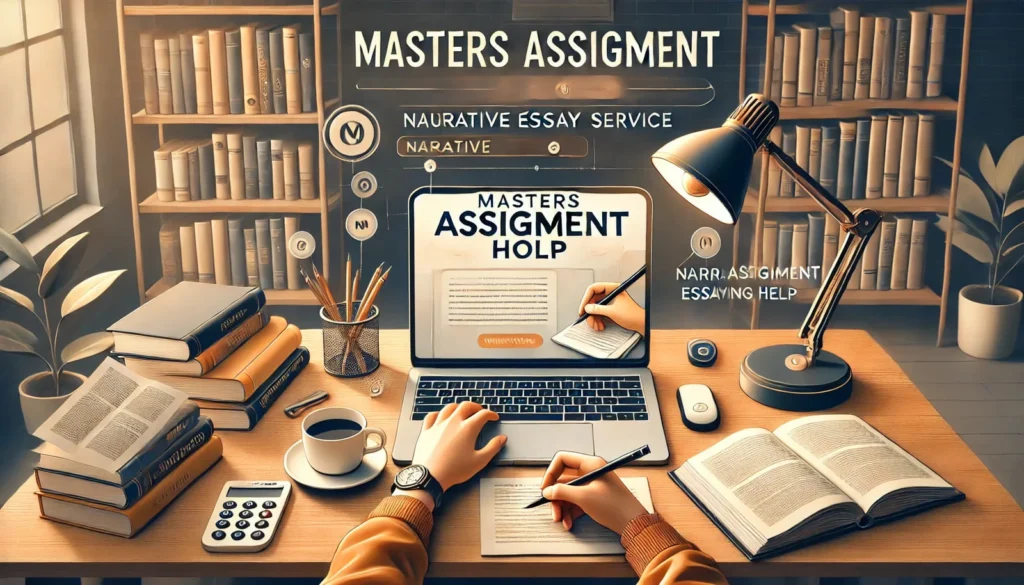Best Narrative Essay Writing Service by Top Writers
We specialize in providing high-quality, custom-written narrative essays that help students achieve academic success. Whether you’re struggling with crafting a compelling story or need assistance with structure and style, our team of expert writers is here to support you.
We offer personalized assignment help to ensure your narrative essay stands out, meets academic standards, and is free from plagiarism, allowing you to confidently submit your work on time.

Complete Authenticity


What is a Narrative Essay?
A narrative essay is a form of storytelling where you share a personal experience, event, or story that is meaningful to you. This type of essay is typically written in the first person and aims to engage the reader with a compelling and reflective account of the event or experience. Unlike expository or argumentative essays, which require you to present facts or arguments, a narrative essay is more about your personal insight and connection to the story being told.
While the narrative essay provides more freedom and creativity, it still requires proper structure and organization. The story should be compelling and clear, guiding the reader through your experience in a way that is both engaging and reflective.

Why Choose Our Narrative Essay Writing Service?
we recognize that writing a narrative essay presents a unique challenge. It requires more than just recounting an event; it demands structure, clarity, and creativity. Here’s why students in the UK and beyond choose us for their narrative essay writing needs:
- Custom-Crafted, plagiarism-free Essays: Every narrative essay we deliver is 100% original and custom-written to meet your specific requirements. We take the time to understand the purpose and requirements of your assignment and ensure that your essay reflects your personal voice while maintaining academic integrity.
- Experienced Writers with Expert Knowledge: Our writers are highly qualified and experienced in crafting engaging narrative essays. They understand the importance of storytelling within an academic context, ensuring your narrative is not only captivating but also structured according to academic guidelines. Whether you’re sharing a personal experience or writing a fictional account, our team will help you craft a story that resonates.
- Timely Delivery: Deadlines are crucial in academia, and we respect that. At Masters Assignment Help, we ensure that your narrative essay is delivered on time, giving you ample time to review and make any necessary revisions. We understand the pressure of tight deadlines and are committed to providing you with high-quality work quickly.
- Academic integrity and confidentiality: We prioritize academic integrity. Our essays are checked for plagiarism using advanced detection tools to ensure they are entirely original. Additionally, we take your privacy seriously. Your personal information and the details of your assignment are kept confidential and secure.
- Affordable Prices for Students: We offer competitive pricing to make our services accessible to students. Quality should never be compromised due to budget constraints, which is why we provide top-quality narrative essays at affordable prices.
Structure of a Narrative Essay
- Introduction The introduction is where you set the stage for your story. It should include an engaging hook that draws the reader in and provides background information. The introduction should also introduce the central theme or message of the narrative, giving the reader a glimpse of what’s to come.
- Body Paragraphs The body of your narrative essay contains the main events or actions of the story. These paragraphs should be organized in a chronological or logical order, with each paragraph focusing on a specific part of the story. This is where you can include vivid details that help the reader visualize the experience, from sensory descriptions to emotions.
- Conclusion The conclusion wraps up the narrative and reflects on the meaning or lesson learned from the experience. It should provide closure and leave the reader with something to think about. The conclusion may also tie back to the theme or message introduced in the introduction.
Tips for Writing a Strong Narrative Essay
- Choose a Meaningful Topic Select a topic that has personal significance. The best narrative essays are based on experiences that had a lasting impact on the writer. Whether it’s a life-changing event or a simple but meaningful experience, your story will be more engaging if it holds real value to you.
- Use Sensory Details and Vivid Descriptions A narrative essay is all about creating an experience for the reader. Use sensory details—what you saw, heard, felt, and smelled—to bring your story to life. The more vivid and detailed your descriptions are, the more the reader will be able to connect with your story.
- Stay Focused on the Central Message Every narrative should have a central theme or message. What did you learn from the experience? What is the takeaway for the reader? Make sure your story is focused and doesn’t stray from this central message.
- Be Authentic Narrative essays are personal, so authenticity is key. Your voice should come through clearly in your writing. Don’t be afraid to share your true thoughts and emotions. Authenticity will help you connect with your audience.
- Edit and Revise Once you have written your narrative essay, take the time to revise it. Check for grammatical errors, awkward phrasing, and any parts of the story that might need clarification. A polished narrative essay will make a stronger impression on your readers.
Common Types of Narrative Essays We Write
- Personal Narrative: A personal narrative essay is about a specific event or experience that has had a profound impact on your life. It’s often written in the first person and focuses on personal insight and reflection.
- Descriptive Narrative: This type of narrative focuses heavily on vivid descriptions, aiming to immerse the reader in the experience. It may focus more on setting or sensory experiences.
- Fictional Narrative: Sometimes, a narrative essay can be fictional. This gives students the freedom to create characters, settings, and events that reflect the theme or message they want to convey.
How Our Narrative Essay Service Works: A Simple Step-by-Step Guide
At Masters Assignment Help, our narrative essay writing service offers a simple, step-by-step process. From submitting your request to receiving a custom-written, plagiarism-free essay, we guide you through every stage to ensure your narrative is engaging, well-structured, and delivered on time. Let us help you craft the perfect narrative essay for academic success!
Submit Your Request
Choose a Writer
Consultation and Guidance
Essay Writing
Quality Control & Plagiarism Check
Quality Control & Plagiarism Check
Once the essay is completed, it goes through a thorough quality check. This includes proofreading for grammar, coherence, and structure. We also run the essay through plagiarism detection tools to ensure that it is 100% original and free of copied content.
Quality Control & Plagiarism Check
Once the essay is completed, it goes through a thorough quality check. This includes proofreading for grammar, coherence, and structure. We also run the essay through plagiarism detection tools to ensure that it is 100% original and free of copied content.
Delivery
Submit with Confidence
At Masters Assignment Help, our narrative essay writing service offers a simple, step-by-step process. From submitting your request to receiving a custom-written, plagiarism-free essay, we guide you through every stage to ensure your narrative is engaging, well-structured, and delivered on time. Let us help you craft the perfect narrative essay for academic success!
Understanding the Different Types of Essays: A Quick Guide
Here’s a concise guide with key points for each type of essay:
Expository Essay
- Purpose: To explain or inform the reader about a topic.
- Features: Focuses on facts and objective information.
- Structure: Introduction, body paragraphs (each explaining a point), and a conclusion.
- Example Topics: How photosynthesis works, the process of recycling.
Descriptive Essay
- Purpose: To describe a person, place, object, or event in vivid detail.
- Features: Uses sensory details (sight, sound, smell, touch, taste) to help the reader visualize the subject.
- Structure: Introduction, body paragraphs focusing on different aspects of the subject, and conclusion.
- Example Topics: Describing your favorite place, an unforgettable vacation.
Narrative Essay
- Purpose: To tell a story, often from the writer’s personal experience.
- Features: Includes elements like plot, characters, setting, and conflict.
- Structure: Introduction, a clear plot progression, and a conclusion that reflects on the story.
- Example Topics: My first day at school, a memorable event in my life.
Persuasive Essay
- Purpose: To convince the reader to adopt a particular point of view.
- Features: Strong arguments supported by evidence, emotional appeal.
- Structure: Introduction (with thesis), body paragraphs (each presenting a point), and a conclusion.
- Example Topics: Why schools should have longer breaks, why exercise is important.
Argumentative Essay
- Purpose: To argue a specific point with well-reasoned arguments and evidence.
- Features: Presents both sides of an issue and refutes opposing views.
- Structure: Introduction (with thesis), body paragraphs (each addressing a point or counterpoint), conclusion.
- Example Topics: The benefits of online education, gun control laws.
Compare and Contrast Essay
- Purpose: To compare and contrast two or more subjects.
- Features: Analyzes similarities and differences in a clear and organized way.
- Structure: Introduction (introducing subjects), body paragraphs (comparing specific aspects), and conclusion.
- Example Topics: Comparing two novels, contrasting two historical events.
Cause and Effect Essay
- Purpose: To explore the causes of an event or phenomenon and its effects.
- Features: Identifies a cause and examines the resulting consequences.
- Structure: Introduction (introducing the cause), body paragraphs (examining causes and effects), conclusion.
- Example Topics: The impact of social media on youth, the causes of climate change.
Process Essay
- Purpose: To explain how something is done or how a process works.
- Features: Step-by-step explanation of a process or instruction.
- Structure: Introduction (explaining the process), body paragraphs (each detailing a step), conclusion.
- Example Topics: How to bake a cake, the process of making a website.
Definition Essay
- Purpose: To explain a term or concept in depth.
- Features: Explores the meaning, history, and implications of the term.
- Structure: Introduction (with definition), body paragraphs (explaining different aspects), conclusion.
- Example Topics: Defining success, the concept of freedom.
Critical Essay
- Purpose: To analyze and evaluate a work (book, movie, article) or an idea.
- Features: In-depth analysis, offering a personal interpretation and evaluation.
- Structure: Introduction (with summary), body paragraphs (analyzing different aspects), conclusion.
- Example Topics: A critical analysis of Shakespeare’s “Hamlet,” evaluating a movie.


